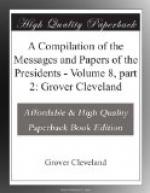The Constitution of the United States, sound financial principles, and our best interests all require that the country should have as its legal-tender money both gold and silver coin of an intrinsic value, as bullion, equivalent to that which upon its face it purports to possess. The Constitution in express terms recognizes both gold and silver as the only true legal-tender money. To banish either of these metals from our currency is to narrow and limit the circulating medium of exchange to the disparagement of important interests. The United States produces more silver than any other country, and is directly interested in maintaining it as one of the two precious metals which furnish the coinage of the world. It will, in my judgment, contribute to this result if Congress will repeal so much of existing legislation as requires the coinage of silver dollars containing only 412-1/2 grains of silver, and in its stead will authorize the Secretary of the Treasury to coin silver dollars of equivalent value, as bullion, with gold dollars. This will defraud no man, and will be in accordance with familiar precedents. Congress on several occasions has altered the ratio of value between gold and silver, in order to establish it more nearly in accordance with the actual ratio of value between the two metals.
In financial legislation every measure in the direction of greater fidelity in the discharge of pecuniary obligations has been found by experience to diminish the rates of interest which debtors are required to pay and to increase the facility with which money can be obtained for every legitimate purpose. Our own recent financial history shows how surely money becomes abundant whenever confidence in the exact performance of moneyed obligations is established.
The Secretary of War reports that the expenditures of the War Department for the fiscal year ended June 30, 1880, were $39,924,773.03. The appropriations for this Department for the current fiscal year amount to $41,993,630.40.
With respect to the Army, the Secretary invites attention to the fact that its strength is limited by statute (U.S. Revised Statutes, sec. 1115) to not more than 30,000 enlisted men, but that provisos contained in appropriation bills have limited expenditures to the enlistment of but 25,000. It is believed the full legal strength is the least possible force at which the present organization can be maintained, having in view efficiency, discipline, and economy. While the enlistment of this force would add somewhat to the appropriation for pay of the Army, the saving made in other respects would be more than an equivalent for this additional outlay, and the efficiency of the Army would be largely increased.




